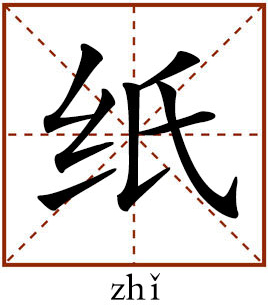Paper

This character originally referred to the dregs produced during the process of rinsing silk fibre. During the Eastern Han Dynasty, Cai Lun (61–121) improved the papermaking process and originated paper in its modern form. Since then, this character has been used as a reference to paper.
纸上谈兵
zhǐ shàng tán bīng
Zhi refers to paper and tan "talk about." Bing refers to military tactics. This idiom literally means talking about warfare on paper. It refers to people who engage in idle talk, but are unable to act on their theories. It is usually used to urge people to combine theories with practical knowledge.
This idiom is derived from a story of Zhao Kuo (?–260 BCE), a general from the state of Zhao during the Warring States Period (475–221 BCE). As recorded in Shiji (Historical Records) by the Han Dynasty historian Sima Qian, Zhao Kuo was the son of the famous general Zhao She. On the orders of King Xiaocheng of Zhao, Zhao Kuo was sent to replace the previous general, famous commander Lian Po, into the battlefield against the state of Qin. Zhao’s mother was worried. She told the king that her son treated a battle like a game of Go, and all his tactics were based on the books he read, so he had no idea what real warfare was like. This developed into the idiom of engaging in "paper warfare." Unfortunately, her advice was ignored by the king. Zhao lost the Battle of Changping, a battle ranked among the most lethal military operations and one of the largest battles in Chinese history (combined troops numbered about 1.1 million). Zhao was killed by the Qin soldiers, and over 450,000 Zhao soldiers were annihilated. The battle reflects a model of total war between states, in which countries use all their human and economic resources in warfare.
This idiom is still popular in recent years, as it is associated with an important concept in state governance: "Empty talk harms the nation, practical action helps it thrive." This idiom emphasizes the importance of strengthening the link between theory and practice. The combination of theory and practice is particularly valuable to state governance. It requires closing the gap between the theory and practice in policymaking.
Edited by REN GUANHONG
